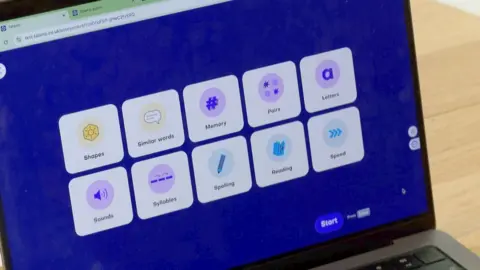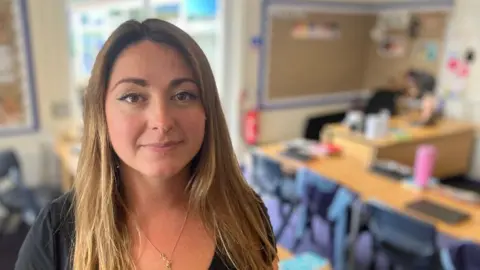Tool for mass dyslexia screening being developed
 BBC
BBCHundreds of UK schools are trialling a new digital tool co-created by an equipment developer from Devon to identify dyslexia in children.
Testing a child for dyslexia is traditionally done on a one-to-one basis and can cost up to £800 per child.
Jamie Wace said the Talamo system, which he co-founded, allowed teachers to screen large groups of children in one short session, cost about £10 per child, and he hoped the digital tool would help transform how those with the condition were diagnosed.
One school in Cornwall said the system had potential in helping develop strategies for children with the condition.

Talamo works by setting children a series of questions and puzzles covering areas such as reading, spelling, memory, and problem solving.
The software then produced a report on each child and the teachers could see where a little extra help might be needed, its creators said.
Mr Wace, 25, who was diagnosed with the condition aged 13 after years of thinking he was "stupid", said the speed and cost of the system had been a factor in it being rolled out to 300 schools across the UK.
He said: "We know that schools don't have many resources, we know that the number of teaching assistants is going down, not up.
"Within that environment we hope that this gives schools the ability to do the screening because, if it's not accessible, and it's not cost efficient, then it won't happen."

Mawnan Primary School, near Falmouth in Cornwall, has taken part in piloting the system, using it since February.
Assistant head teacher Catherine Prosser said it had huge potential.
She said: "The reports it produces are visual, very accessible for children and parents.
"We can talk to the children one-to-one, looking at areas of strength and areas they might struggle with. We can then coach them and develop strategies to help with their learning journey.
"I think that's really powerful to help them be able to move forward to secondary school with those strategies in place and understanding how their brains work."
The British Dyslexia Association said it was not able to endorse one specific screening system over another, but said identifying dyslexia early was vital to a child's educational future.
The Department for Education said: "Dyslexia should never be a barrier to a brilliant education, or to what children can go on to achieve."
It added it was investing £1bn more into Send [special educational needs and disabilities] schools this year as part of work to "further improve experiences for neurodivergent children, including those with dyslexia".
Follow BBC Cornwall on X, Facebook and Instagram. Follow BBC Devon on X, Facebook and Instagram. Send your story ideas to [email protected].
